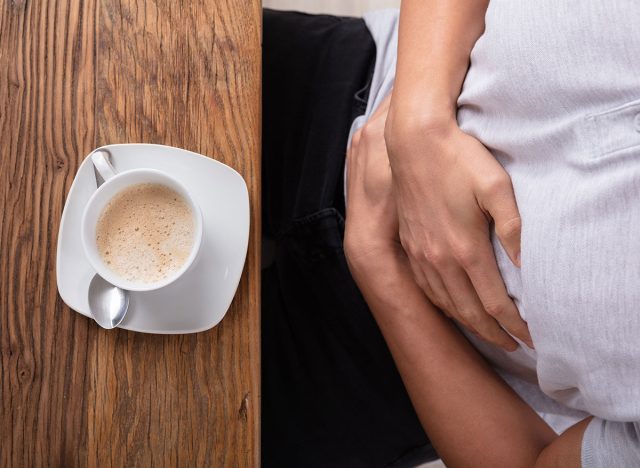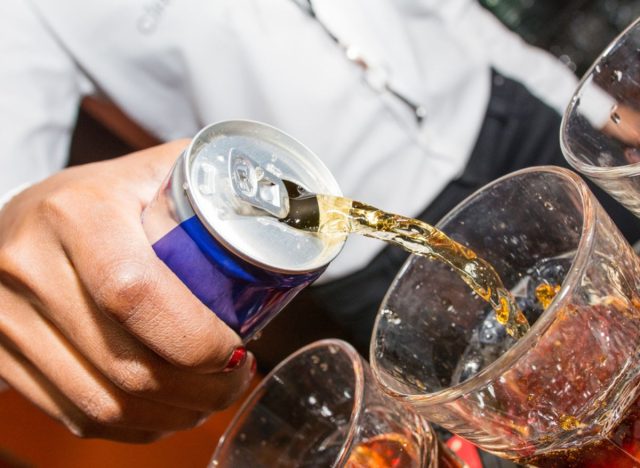You've probably heard the classic jingle for Pepto Bismol: "Nausea, heartburn, indigestion, upset stomach, diarrhea!" Interestingly enough, the same symptoms that this drinkable, Barbie-pink syrup is designed to help soothe and treat can also be triggered by other drinks that—depending on the situation and circumstances—can potentially irritate your stomach and disrupt your digestive tract's otherwise healthy flow. But which drinks are among the worst for your digestion?
Though not all drinks are guilty of messing with your digestion, some beverages might be more culpable than others. Drinks comprised of ingredients that can affect the production of acid in your stomach, dehydrate you, gradually thin the lining of your stomach and intestines over time, or even interfere with your hormones in certain ways can contribute to indigestion. Additionally, there are certain conditions that may make your digestive tract more sensitive to the effects of certain drinks, leaving you more vulnerable to experiencing nausea, heartburn, indigestion, abdominal pain, or other symptoms that may have you spending more time in the bathroom than you'd wish to admit.
For instance, "if you have a GI condition, you may want to be more cautious around certain drinks and check your labels for ingredients," Caroline Thomason, RD, CDCES, dietitian, nutrition expert, and diabetes educator explains to Eat This, Not That!
To find out which drinks might be more prone to mess with your digestion, we spoke with a few dietitians to get their expert insight on how these beverages may impact your body. Although some of the items can be responsibly incorporated into a balanced diet, knowing which kinds of drinks might have you reaching for a bottle of Pepto will better prepare you to imbibe these beverages under more gut-favorable circumstances.
Coffee

Although coffee provides certain health benefits and be incorporated into a quality, well-balanced diet, under the right set of circumstances, the caffeine content of this beverage can also mess with your digestion.
In fact, caffeine consumption can sometimes slow down your body's digestive process because of its ability to also release stress hormones, like cortisol, adrenaline, and norepinephrine, that can increase your heart rate while concurrently ramping up your energy levels. When this occurs, the blood supply that typically would go to your intestines decreases, and this can impact the pace at which your body would normally digest items you consume.
Studies also suggest that coffee can sometimes overstimulate the production of stomach acid, causing acid reflux and heartburn. This is especially true if drinking coffee on an empty stomach.
Thomason also points out that "coffee, of course, has a laxative effect with some folks. Particularly those with diarrhea-prone IBS may have a sensitivity to coffee," says Thomason.
Alcohol
If you've ever experienced the effects of being overserved or had a brutal hangover, then you're probably familiar with the extent to which alcoholic drinks can mess with your digestion and have experienced the resulting discomfort firsthand. But why does this happen?
"Alcohol uniquely impacts digestion because it is prioritized by the liver to be detoxified," says Thomason. "So, if you are eating and drinking at the same time, digestion actually gets put on the back burner until alcohol is completely detoxed from the body."
Toby Amidor, MS, RD, CDN, FAND, award-winning nutrition expert and Wall Street Journal bestselling author of The Family Immunity Cookbook, adds that research shows that "consuming large amounts of alcohol regularly can lead to inflammation of the intestines."
Carbonated beverages
What's interesting about carbonated drinks like sodas or seltzers is that while many turn to these bubbly beverages to help soothe stomach pain or nausea, they can also contribute to digestive disruptions, as well.
"Carbonated beverages may cause bloating for some folks or heartburn," says Thomason.
"Some folks find that carbonated water helps their digestion and reduces indigestion. However, in [other] folks, it can cause gas or bloating," adds Amidor. "Using straws to drink carbonated water [or] beverages increases gas and bloating."
If you love a bubbly bev, in addition to drinking these without a straw, Thomason recommends opting for soda alternatives, like OLIPOP. This soda alternative, in particular, not only contains less added sugars than your standard soda, but also they're made with plant fiber and prebiotics, both of which can be advantageous to digestive health. As Thomason notes, these sodas can provide "a whopping 9 grams of prebiotic fiber per can, which is 32% of the daily value for fiber."
Energy drinks

"Energy drinks can be high in sugar, which can negatively affect the gut microbiota," says Lauren Manaker, MS, RDN, LD, CLEC, author of the First Time Mom's Pregnancy Cookbook, the 7 Ingredient Healthy Pregnancy Cookbook, and Fueling Male Fertility. "They also provide very little in the nutrition department, and zero fiber."
Amidor adds that, although case studies are not always the strongest representation of evidence, that many have linked drinking energy drinks to chronic gastritis, a condition where the lining of the stomach has sustained long-term damage.
"There are several case studies that have linked overconsumption of energy drinks to chronic gastritis," says Amidor. "However, more studies are needed."
"Energy drinks may have a similar effect as coffee due to the caffeine. However, energy drinks are also often sweetened with artificial sweeteners or sugar alcohols," Thomason explains. "Sugar alcohols like maltitol or xylitol are unable to be digested by the bacteria in your gut, and may cause gas and bloating as they travel through our digestive system."
"Typically, sugar-free beverages have some form of artificial sweetener or sugar alcohol, so it's important to check the labels," adds Thomason.